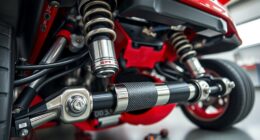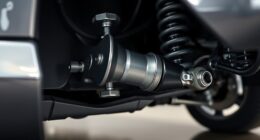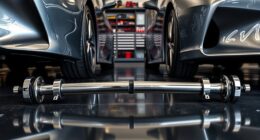Ford ECU tuning software offers a variety of tools perfect for your DIY performance mods. You’ll find options like TunerPro RT, ideal for older vehicles, while HP Tuners provides extensive features for detailed adjustments. The user-friendly Cobb Accessport comes with pre-installed maps for easy tuning. To connect, don’t forget compatible hardware like USB or Bluetooth adapters. Joining tuning communities can also enhance your experience and knowledge. Always back up your original settings and choose licensed software to avoid risks. If you’re curious about the best path for your vehicle’s performance, stick around to uncover more insights! If you’re looking for top Porsche tuning in Wilton, there are specialized software and tools designed specifically for Porsche vehicles. Options like the COBB Accessport for Porsche offer a user-friendly interface and pre-installed maps to make tuning easier. Joining Porsche tuning communities can also provide valuable insights and advice from experienced enthusiasts and professionals in the industry. Whether you’re a beginner or an experienced tuner, exploring different software and tools can help you achieve the best performance for your Porsche.
Key Takeaways
- TunerPro RT is ideal for older Ford models, offering free software with extensive data logging capabilities for DIY enthusiasts.
- HP Tuners provides comprehensive features for detailed engine and transmission adjustments, supported by a strong community for troubleshooting.
- Cobb Accessport is known for its user-friendly interface, featuring pre-installed maps and options for custom tuning, suitable for beginners.
- Essential hardware like USB or Bluetooth adapters and the Moates Quarterhorse enables real-time tuning for models from 2004 and older.
- Engaging with tuning communities and forums enhances knowledge sharing and provides access to customized tuning files for improved performance.
Tuning Software Overview
When it comes to tuning your Ford vehicle, you've got a range of software options at your fingertips, from free DIY tools to more advanced, closed-source solutions. Tuning software like TunerPro RT and HP Tuners stands out for their extensive customization capabilities.
If you're working with a post-1997 model, core tuning software supports J2534 interfaces, allowing you to reprogram ECU settings effectively without needing chip modifications.
For older vehicles, TunerPro RT is particularly favored due to its rich features and strong community support. It enables real-time tuning adjustments when paired with hardware like the Moates Quarterhorse, giving you an edge in performance mods.
The landscape of Ford tuning software has been shaped by EPA regulations, which have impacted hardware availability. This has pushed many enthusiasts toward community-driven solutions for resource sharing and collaboration.
To further enhance your tuning knowledge, online forums and educational resources like Tuning School and HP Academy offer invaluable insights. With the right tuning software and support, you can confidently navigate the complexities of Ford ECU tuning and reveal your vehicle's true potential.
Essential Hardware Requirements

To get started with Ford ECU tuning, you'll need the right hardware to guarantee compatibility and effective performance.
USB or Bluetooth adapters are essential for connecting to your tuning software, while a bench harness can simplify your setup.
Don't forget that different ECUs might require specific components, so check the compatibility based on your vehicle's model year.
Recommended Adapters and Interfaces
Finding the right adapters and interfaces is essential for effective Ford ECU tuning. To guarantee compatibility with your tuning software, USB or Bluetooth adapters are preferred, as they facilitate a smooth connection to Ford ECUs.
A popular choice among enthusiasts is the Moates Quarterhorse, priced at around $250, which allows for real-time tuning adjustments, particularly for 2004 and older models.
If you're working with older Ford ECUs, the J3 port provides direct access, enhancing your data logging and tuning capabilities. For pre-1996 EEC-IV systems, you'll need to use chips for aftermarket tuning, but post-1997 models can be reprogrammed without those modifications, making your tuning process simpler.
Consider investing in a bench harness, similar to those utilized in LS tuning communities, if you're looking to create custom setups or troubleshoot issues effectively. This hardware can be a game-changer for diagnosing and adjusting your ECU setup.
Essential Tuning Components
Although many enthusiasts focus on software, having the right hardware components is vital for successful Ford ECU tuning. First and foremost, you'll need a USB or Bluetooth adapter to connect to your ECU. Popular options like the Moates Quarterhorse are great for older models.
If you're working on pre-1996 Ford models, you'll want to incorporate aftermarket chips, while post-1997 models allow for reprogramming without chip modifications.
Using a J2534 interface is essential for compatibility with core tuning software, enabling you to flash and modify your ECU effectively. A bench harness is also a recommended tool, as it simplifies access during the tuning process, much like setups used in LS tuning communities.
Additionally, consider harvesting components from older Ford models, which can be a cost-effective way to acquire necessary connectors and hardware for your tuning projects.
With the right vital tuning components in hand, you'll be well-equipped to engage in open source tuning solutions and make the most of your Ford's performance capabilities. Always verify your hardware is compatible with your tuning software for a seamless experience.
Compatibility With ECUS
How can you guarantee your Ford ECU tuning is successful? Ensuring compatibility with your specific ECU is essential for effective DIY tuning.
For older models, using USB or Bluetooth adapters is preferred for reprogramming. If you're working with a 2004 or older Ford ECU, consider the Moates Quarterhorse, which allows real-time tuning adjustments and costs around $250.
For pre-1996 EEC-IV systems, you'll need chips for aftermarket tuning, while post-1997 models can be reprogrammed without those modifications.
Additionally, a bench harness might be necessary for certain setups, similar to those used in LS tuning communities, to enhance your ECU tuning process.
Don't overlook the importance of the J3 port, as it provides direct access for quicker data logging and tuning adjustments, ensuring your modifications achieve peak performance.
By equipping yourself with the right hardware, you'll set the stage for successful DIY tuning and access the full potential of your Ford vehicle.
Community Support and Resources

When diving into Ford ECU tuning, tapping into community support and resources can make all the difference. Engaging with tuning communities on platforms like Reddit and Facebook provides you with valuable insights and real-time support from experienced DIY enthusiasts.
These interactions can help you troubleshoot issues and enhance your tuning projects effectively.
Here are three key resources to evaluate:
- Tuning Forums: Many forums offer free downloads of tuning files and resources, making essential tools for Ford ECU modifications easily accessible.
- Online Educational Platforms: Websites like the Tuning School and HP Academy provide structured learning opportunities, helping you improve your skills and understanding of Ford ECU tuning.
- Collaboration Groups: Joining tuning groups often leads to the sharing of customized tuning files, allowing you to optimize performance based on user-specific modifications and experiences.
Market Trends and Insights

As the Ford aftermarket tuning landscape evolves, you'll notice significant shifts driven by regulatory changes and community needs. Since late 2022, EPA regulations have limited hardware availability, making it tougher for DIY enthusiasts like you to find suitable tuning tools.
However, Core Tuning software has stepped up as a primary option, providing compatibility with J2534 interfaces across various Ford models.
The Ford aftermarket tends to prioritize profit margins over volume sales, which contrasts sharply with the GM aftermarket's broader array of tuning tools thanks to higher sales volumes. This disparity means you might find fewer options when searching for the right tuning solution.
Yet, the need for user-friendly tuning solutions is rising, alongside the growing Right to Repair advocacy. These trends are pushing developers to create more accessible tuning software tailored for Ford vehicles.
Additionally, community-driven resources and forums are becoming essential for sharing knowledge and tools, as you navigate the scattered information landscape. By staying engaged with these platforms, you can keep up with the latest innovations and best practices in Ford tuning, ensuring you're equipped to enhance your vehicle's performance.
Risks and Best Practices

When you start tuning your Ford's ECU, it's essential to recognize the common risks involved, like bricking your ECU with unreliable tools.
To protect yourself, always back up your original settings and invest in licensed tuning software.
Common Risks Involved
What risks should you be aware of when tuning your Ford ECU? Tuning your vehicle can be exciting, but it does come with some potential pitfalls you need to take into account. Here are three common risks involved:
- Using Unlicensed Software: Opting for unlicensed or cracked tuning software can lead to ECU failure or bricking. These tools often lack quality control and support, putting your vehicle at serious risk.
- Cheap Hardware: Relying on cheap Chinese clone tools may lead to poor performance or even damage to your ECU. It's important to invest in reliable and reputable hardware to avoid costly repairs.
- Improper Adjustments: If you're not familiar with the specific tuning maps, making improper adjustments can cause engine damage or inefficiencies. Understanding how each setting impacts performance is vital for successful tuning.
To minimize these risks, always back up your original ECU settings before making changes.
Engage with experienced DIY tuners in forums. Their insights can help you navigate the tuning process more effectively, reducing the likelihood of mistakes.
Recommended Safety Practices
To guarantee a successful tuning experience and protect your vehicle, following recommended safety practices is essential.
First, always create a backup of your original ECU settings before making any modifications. This step is critical to prevent any loss of functionality or performance. While you might be tempted to use free software, investing in licensed tuning software and reliable hardware tools is imperative. Cheap, unverified tools can damage your ECU, leading to costly repairs.
Next, understand the specific ECU maps relevant to your vehicle. Improper adjustments can cause engine performance issues or even failure. Engaging with tuning communities can be incredibly beneficial; sharing experiences and best practices can help you navigate the complexities of DIY tuning more safely.
As a beginner, be cautious about modifying high-risk areas related to engine performance. Start with simpler tweaks, like removing speed limiters, to build your confidence and experience.
Popular Tuning Software Options

Numerous tuning software options are available for Ford ECUs, each catering to different needs and expertise levels.
Whether you're a beginner or an experienced tuner, you can find a tool that suits your custom tuning requirements. Here are three popular options:
- TunerPro RT: This free software is widely recommended for older Ford ECUs. It offers extensive data logging capabilities and user-friendly features, making it ideal for DIY enthusiasts.
- HP Tuners: Known for its thorough features, HP Tuners allows you to make detailed adjustments to engine and transmission parameters. It also boasts strong community support, which is invaluable for troubleshooting.
- Cobb Accessport: This tool is well-loved for its simplicity, especially among Ford tuners. It includes pre-installed maps and custom tuning options, catering to both novice and advanced users.
Each of these options has its unique strengths, so you can choose based on your specific needs.
With the right tuning software, you'll be well on your way to enhancing your Ford's performance.
Frequently Asked Questions
What Is the Best Programmer for Ecu?
When choosing the best programmer for ECU tuning, consider your vehicle's needs and your experience level. HP Tuners and SCT Livewire are popular options, each offering unique features that cater to various tuning preferences.
What Is the Best Car Tuning Software?
When choosing the best car tuning software, consider your experience level and specific needs. HP Tuners offers extensive features, while SCT's user-friendly interface suits beginners. TunerPro's free option is great for older vehicles, too.
Can You Do Your Own ECU Tune?
Yes, you can definitely do your own ECU tune! With the right software and tools, you'll enhance your vehicle's performance. Just remember to back up your original settings and understand the tuning process thoroughly.
Which Software Is Used for ECU Programming?
Imagine a painter with a palette; you've got various software tools for ECU programming. TunerPro RT, HP Tuners, SCT, Cobb Accessport, and MegaSquirt each offer unique features, helping you create your vehicle's masterpiece.
Conclusion
In summary, diving into Ford ECU tuning can release incredible performance gains for your ride. Did you know that tuning can boost horsepower by up to 20% or more, depending on your setup? With the right software and tools, you're not just modifying a car; you're transforming your driving experience. Just remember to stay informed and connect with the community. Embrace the journey of DIY performance mods, and enjoy every thrilling mile ahead!










